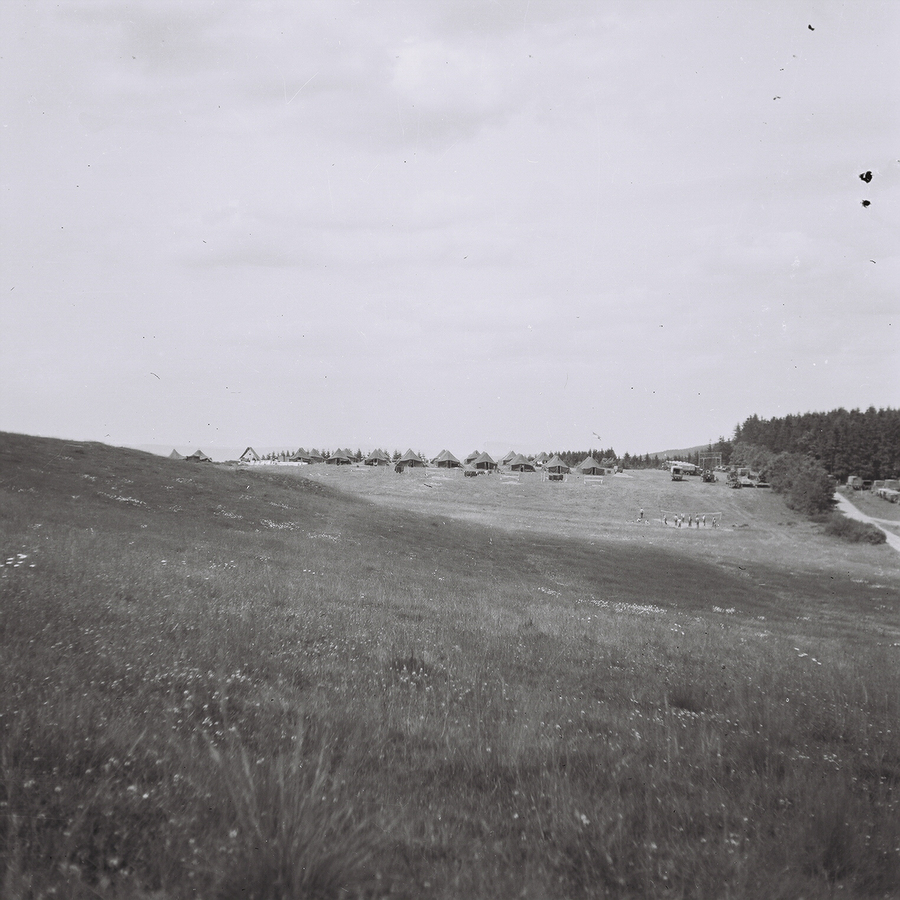Cornwellshire

Pyramidal tents, likely in England. From the collection of Irving Mayer.
On July 14th, Lt. Col. Truly assembled 23rd Hq’s entire organization and informed them that tomorrow was “the day.” He outlined the work of the Elephant and Lt. Mason’s platoon and gave the encouraging word that they had suffered no casualties. His only combat advice was, “To dig deep and don’t forget to change your drawers.” Announcing that it was the last time he would allow himself to be cornered thus, the Colonel proceeded to answer all questions.
By 0900 hours, July 15th, the march and motor parties were once more on their ways to the marshalling area, which was located two miles north west of Turo, Cornwellshire (174697).
Marshalling Area o/rcrp/4 was a wired in camp composed of a quadrangle of pyramidal tents with a series of flies and storage tents at one end for the kitchens and mess halls. The pyramidals were designed to shelter six men but the exigencies of war enabled eight men to sleep in them.
Much to the surprise of the men, passes were issued at the marshalling area. They found it difficult to reconcile the restriction at Charborough Park with the freedom granted at this last milestone.
From pass, Pvt Whitey Wilson returned with the news that a white woman across the street had a couple of pickaninnies. On his free time, T/5 Francis Taylor followed what he thought was a positive lead to love and ended up having tea with a respectable old English couple.
To be sure that the men were ready for combat, Lt. Kelker had the assistant squad leaders conduct a rifle inspection. The second platoon forgot the “Sir” in answering “Yes.” For this lapse of military courtesy, they had to practice the manual of arms.
The chow hounds remember the camp for the excellent food and for the medical captain who instructed Lt. Kelker about personalized washing of mess gears and the whereabouts of the end of the chow line. Mess attendants remarked that the company was the happiest bunch that had ever come through their chow line. Perhaps the knowledge that the Elephant and Lt. Mason’s platoon had no casualties accounted for this attitude.
On July 17th at 0700 hours, while the men were still wondering if Pfc. Bearl Donnely had really fallen into a flooded air raid trench illicitly used as a urinal, the company said “hail and farewell” to the marshalling area and made its way to Falmouth. Here the motor party boarded one transport and the march party another, the S. S. John S. Mosby.
Four days spent on the boats left memories of overcrowded sleeping quarters, terrible latrines, “C” rations and the smell of impregnated clothing worn by an Ack-Ack outfit that was quartered in the hole with the men. Despite the seasick pills taken a few hours before boarding, there were many victims of mal-de-mer.
In the middle of the channel, Pvt. Al Greenberg’s M1 disappeared. Lt. Kelker held a company formation, had each man examine his piece and then gave out the number of the missing weapon. Other units aboard were also furnished the number and they checked their arms. After a stern to stem search, the M1 was still missing.
Next day, Lt. Kelker told Pvt. Greenberg that in discussing the incident with other officers, all agreed that a man who boarded a ship with an M1 should leave with one.
Late that afternoon, Pvt Greenberg scrambled down the rope ladder with an M1 slung over his shoulder. The company motto that a “good soldier is never short equipment” still held.
Disembarkation was set for 1000 hours, July 21st. At this time, the first of our stalwart men descended the rope ladder with full field equipment. Because the sea was running high, it was necessary for the men to coordinate the bobbing of the landing barge with the final step off the rope ladder. A dip in the drink plus the peril of being crushed between the slamming barge and the ship, awaited the soldier who misjudged his step.
The skipper of the barge was reluctant to take aboard the men because they had no life preservers. At Lt. Kelker’s insistence, he acquiesced and the men started down the ladder. Thirty three men had made the tricky descent when a sudden swirl of the water caused Pfc. Frank (Little Jose) Michno to miss the barge. Quick work by Pvt. Irving (Cato) Weinberg and Pvt. Frank Wilczinski, the company barber, saved Michno’s noggin. The pair hauled him into the barge just a moment before it slammed against the transport.
Besides being severely shaken up, Little Jose received a punctured cheek; but on him his newly acquired dimple wears well. This near disaster caused the skipper of the barge to halt the disembarkation. The order stranded nearly forty men on the transport. These poor souls were forced to spend their next three days eating and sleeping but some how managed to sweat it out. The master of the ship was heard to remark that his guests were eating him out of gig and galley.
For those who boarded the barge, it was a short but surging ride. They had barely shoved off from the transport when a wave swept the conning tower away. Low tide prevented the barge from beaching and it was necessary for the men to transfer to “ducks” which landed them on “Omaha Beach.” Unbeknown to the barge, the transport had radioed the beach for an ambulance to care for Pfc. Michno. The duck had no sooner hit the shore when a medic rushed up and demanded the injured man. Michno staggered forth under his own power; the medic gave him a quizzical look and, after a few moments hesitation, ordered him into the waiting ambulance. The incident was formally closed when Frank Wilczinski remarked that in his entire barbering career he had never seen such a “close shave.”